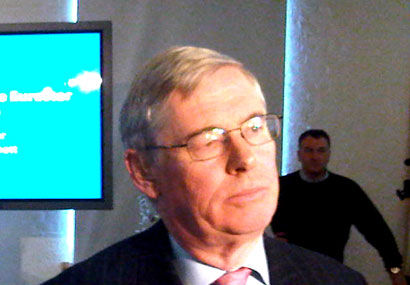ONE of the two leaders of the Eurostar independent review made a plea to both Eurostar and Eurotunnel as the results of the inquiry into the pre-Christmas crisis, in which 2,000 passengers were stranded, were being made public today.
The review was led by former Eurotunnel director Christopher Garnett and SNCF board director Claude Gressier. After the results of the review had been explained, Mr Garnett said: "Eurostar was found wanting. This must not happen again." He also appealed to Eurotunnel to improve its procedures, particularly when performing rescues.
The three points which have gained the most attention are train reliability, evacuation and rescue procedures, and managing disruption. Mr Garnett told his audience that it was not appreciated immediately that the first train of the five which failed actually had a problem.
The crisis was triggered by the successive failures of five trains in the Channel Tunnel on 18 December, after they had travelled through heavy snow. This has been blamed for penetrating engine compartments and causing short circuits.
M. Gressier said that both short- and long-term engineering improvements were being recommended on the trains, with sensitive components to be protected by acrylic sheets for now but perhaps completely sealed in due course.
Mr Garnett has also been explaining how conditions were particularly bad on a train from Euro Disney near Paris, because there were many children and babies on board. He has been describing how emergency doors were opened on the train in a bid to reduce the increasingly high temperatures inside.
He had some sharp words for Eurotunnel as well as Eurostar, citing the confusion and lack of information when passengers were transferred from failed Eurostars to a Eurotunnel Shuttle which had been brought to the scene on the French-bound line.
He also discounted Eurotunnel's claim that safety had been endangered when passengers were allowed to defy the rules by taking their luggage with them during the evacuations. "That provided reassurance," he believed.
He called for better information equipment at the terminals, fit for purpose if major disruption does occur, including variable-message boards. He was also critical of the evident conflict between Eurostar and Eurotunnel in the days following the emergency. "There was something of a war of words on Christmas Day," he said. "Some things would have been better left unsaid. After Christmas, things began to improve."
He revealed that the review had received 700 letters from members of the public, some of whom were critical of the time taken by Eurostar to make promised compensation payments. Those actually trapped on the trains each received £150, as well as a refund and a free journey in the future.
The cost to Eurostar has been put officially at £10 million, but the company will now be redoubling its efforts to rebuild confidence, after by far the worst incident to affect the operator in its 15-year history.
The crisis has come at a particularly unfortunate moment. International open access became a reality on 1 January, and Deutsche Bahn is one of several possible candidates who have expressed an interest in competing with Eurostar on what had been its exclusive route to London.
Eurostar crisis verdict: ''This must not happen again''
12th February 2010


